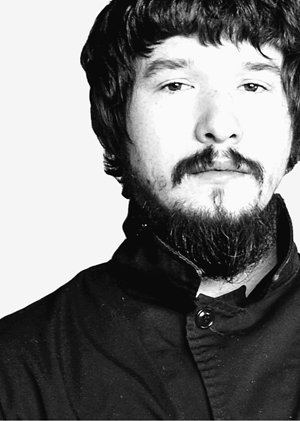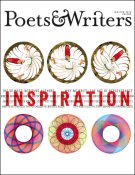Jesse Ball is the author of the poetry collection March Book (Grove Press, 2004) and two novels, The Way Through Doors (Vintage, 2009) and Samedi the Deafness (Vintage, 2007). He was awarded the 2008 Plimpton Prize for his story "The Early Deaths of Lubeck, Brennan, Harp, and Carr," and a book of poetry and prose, The Village on Horseback, is forthcoming in 2010 from Milkweed Editions. Ball also has illustrated books. He and his wife, Icelandic poet Thordis Björnsdottir, coauthored The Disastrous Tale of Vera and Linus, a haunting story about a sinister couple, which features sketches by Ball and was published by the Icelandic press Nýhil in 2006. He also illustrated Björnsdottir's book of poetry Og svo kom nóttin (And Then Came the Night), published by Nýhil in 2006. He teaches unconventionally themed creative writing courses—some of which explore such topics as walking and lying—at the School of the Art Institute of Chicago.

Did you start
drawing before or after you began writing?
I've always done a lot of drawing. Even as a very
small child I did lots of drawing. I drew monsters—sort of spiky monster guys
with little legs and arms. At that time I decided I was going to write a letter
to the Queen of England, so I did. The contents of the letter was mostly
drawings of monsters. A year passed and I got a reply from the lady-in-waiting
to the Queen saying that the Queen liked the monsters very much. I consider her
my first patron, and that gave me the encouragement I needed. Despite years of
discouragement thereafter, nobody could stop me from drawing, because the Queen
told me it was fine.
When I was a little older than that, I had this big problem with my other types of drawings, landscapes with stuff flying around. I would just keep drawing and drawing on top of them. I guess they call it perseveration. I would draw a full drawing then draw another one on top of that and another one on top of that and another one on top of that until the whole paper was filled.
Drawing is something I do, in terms of the writing, because I feel like the drawings give another indication of the situation of the work, and that can help people understand my work better. But I make no claims to be a good artist.
How did you come to illustrate your
wife's book?
She
had an offer for a poetry book and there were drawings that I was thinking of
doing, so we decided to combine them....
I did some of the drawings after the poems, and she did some of the poems after
the drawings.
Do any of your drawings or writings
inspire one another?
I wouldn't say that I've ever written something from a
drawing, but I think for me the drawing is closely linked to handwriting, which
is a very important thing for me. There are some people, like Rudolf
Steiner—you know, the guy who did the Waldorf education system? He has a lot
of stuff on handwriting and how a person should develop it. I like to keep
journals, so I'm always thinking about my handwriting and changing it through
the years and stealing new ways of doing letters from people that I like. I
think the drawing and the handwriting are very linked because as my handwriting
changes, my drawing also changes.
Does concentrating on the
handwriting tie into your discipline as a writer?
Every way in which you can examine your practice and
heighten it and move forward with it gives energy to the whole rest of your
practice. So a small thing like changing the handwriting ends up easing the way
toward other things.
How do feel
about your drawings appearing in published books, if you don't consider
yourself a good artist?
I'm very fond of the guys that I've made. But their
purpose is less for someone to look at them and think, "This is so
magnificent," and more to get a feeling of that drawing's position and
representational space and what it's intended to do. From that person's sense
of the position of a drawing, they can apply it to many other things within the
work and get a vector of the work.
You write novels in a concentrated
time period. How do you fill the voids between writing spurts?
I have a journal that I keep. I write things down. An
example: I'm walking down the street and out of the corner of my eye I see
somebody wearing pajamas and running around with a really large carrot; I get
excited and write down "man with pajamas, carrot." By and large that's the
writing process that goes on in between books. I believe that writing is a
product of the perception you evolve as a writer.
As a writer do you feel like you
have to be in a certain place to accomplish this?
I really like cafés in a country where my speaking of
the language is bad enough that I have to concentrate [to understand it], so
then you get this pleasant din of voices around you and you can write
unfettered.
How does your teaching at the Art Institute of Chicago tie in?
In my teaching I try to get into people's practice and
help rearrange it in a way that creates more work. Usually what stops writers
from writing is some kind of poorly laid-out practice that causes them to get
tired really quickly—to not want to write. You could be a great writer but if
you don't have it orchestrated so that you want to write, then you're not going
to produce anything.
While you were in college at Vassar
you assembled your books and distributed them yourself.
When you write you don't want to surrender to a
publishing company the moment when a book is judged to be a book or not a book.
You decide if it's a book or not a book, no one else does. That's your
prerogative as the writer. If you imagine yourself in a postapocalyptic world
where—somehow you managed to survive—you're in this log cabin and there's a
little printing press there, you're writing these books. You produce a book.
Then it's a book. You just made a book. That kind of agency you want to have
always. Whether you're in a postapocalyptic cabin or in your life now. You
should never surrender that.
In terms of giving the manuscript out as a little book to people, for poets of the sixteenth and seventeenth centuries sometimes their audience was just the few friends they managed to pass the book out to. You're no less a writer. As soon as someone makes a book and gives it to someone else, that's the whole thing. There isn't anything to be added to it.








